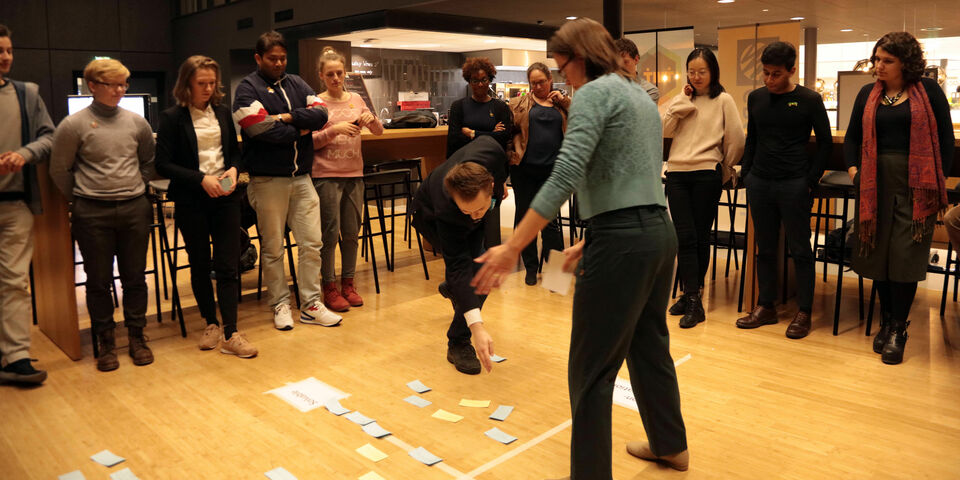‘Saying no is a big challenge’
Deadlines. The biggest cause of stress for the participants in the student well-being brainstorming session organized by Groep-één | ESR and TINT yesterday. About fifteen attendees discussed in Atlas in an intimate setting what well-being is, what the struggles are and how they can be solved. All the good ideas this evening yields will be used in an action plan that Groep-één | ESR will present to the Executive Board.
Mentimeter helps to get direct inspiration for the discussions that will follow. What does well-being mean to you? As soon as the participants participate via their telephone, their answers appear on a large screen in a word cloud. The terms that are mentioned more often are shown larger: ‘happiness’ and ‘safety’. But there are also terms like ‘balance’, ‘freedom’, ‘health’ and ‘no stress’, among other things. Another question: "If you have ever felt stress, what was the main cause?" The term ‘deadlines’ is at the heart of the word cloud, but ‘pressure’ and ‘fear’ are also mentioned multiple times. With this input, the group discussions start and the participants share their struggles. Patrick Luu, a Communication student at HAN who’s doing an internship in Eindhoven is also present tonight. He appreciates the event: "Here it is a safe place to speak about the challenges you face without being judged for it or feeling like you are a burden."
Saying ‘no’
During the group discussions, it becomes clear that the toughest challenge is to say 'no'. A recognizable issue for many. But as the group agrees philosophically: if you always say ‘yes’, it is sometimes a ‘no’ to yourself. Something to think about. Furthermore, various people mention sleeping problems due to being constantly busy in their head with things that have to be done, as well as people who mention having difficulties setting priorities. And then there are also just too many (fun) things to choose from, every day. That also puts pressure on you, according to a few.
There is a large cross on the ground: on the x-axis the study-related versus non-study-related problems and on the y-axis the solvable versus non-solvable issues. Students may place the card with their challenge(s) on or around the cross where it fits best. Fortunately, very few people put their struggle(s) in the direction of the unsolvable corner. About a quarter is study-related, another quarter is not and the rest is exactly on the center line.
Working on well-being
Groep-één | ESR’s chairman, Naomie Amsing, is part of her party's well-being taskforce and finds it important to put this topic on the agenda. “I have had problems with my mental health as well, but I now know that I am good enough. I want it to be more generally accepted to sometimes just have a problem. And you can fix it, but you don’t always have to.” Ana Pereira from co-organizer TINT believes it is important to have tonight’s initiative. "If we are better aware of what students struggle with and what they need, it can help to find solutions and also to organize related activities with TINT."
Rachel Philips, student psychologist at the TU/e is also present during the brainstorming and notices that there are enough challenges that do not only apply to students, "such as trying to find balance. Certainly these days when there is so much out there to choose from.” Chemistry student Limi Kalapurackal recognizes that. “I feel a lot of pressure in various aspects of my life. I am so busy that I often don't have time to reflect on myself. During a discussion like this you start to think more about it and I think it is good to hear the experiences of others. It would also be good if the ways that lead to help become more visible, because they may not be known to everyone yet."
Solutions
The study-related, solvable problems are picked up from the floor and spread over the three discussion tables, where the participants then try to come up with solutions. These include setting up peer groups (because it helps to share your experiences with like-minded people) and offering a course on prioritizing. Both already exist at ESA, but not yet in English, which appears to be needed. A participant suggests that more resources should be added to ESA to (better) help the students with problems.
Against procrastination, the participants say you should have a critical look at your work environment: which place encourages you to study without distraction? It can also help to tell your friend or housemate that you are going to work on something or to share a certain goal with him/her. This gives you additional motivation to actually do it. It is also important that every course has a clear calendar to make it easier to study. For sleeping problems, the telephone is immediately accused of being a jammer: “the light it radiates certainly does not help to fall asleep. If you can’t quiet your mind, write things down on a piece of paper so that you know you cannot forget about the things on your mind and therefore will be able to let go more easily," says one of the participants.
After the session there are drinks available at Hubble and participants are invited to chat a bit more. For those who want. "And you can say no," it sounds as an ironic conclusion to the evening.




Discussion